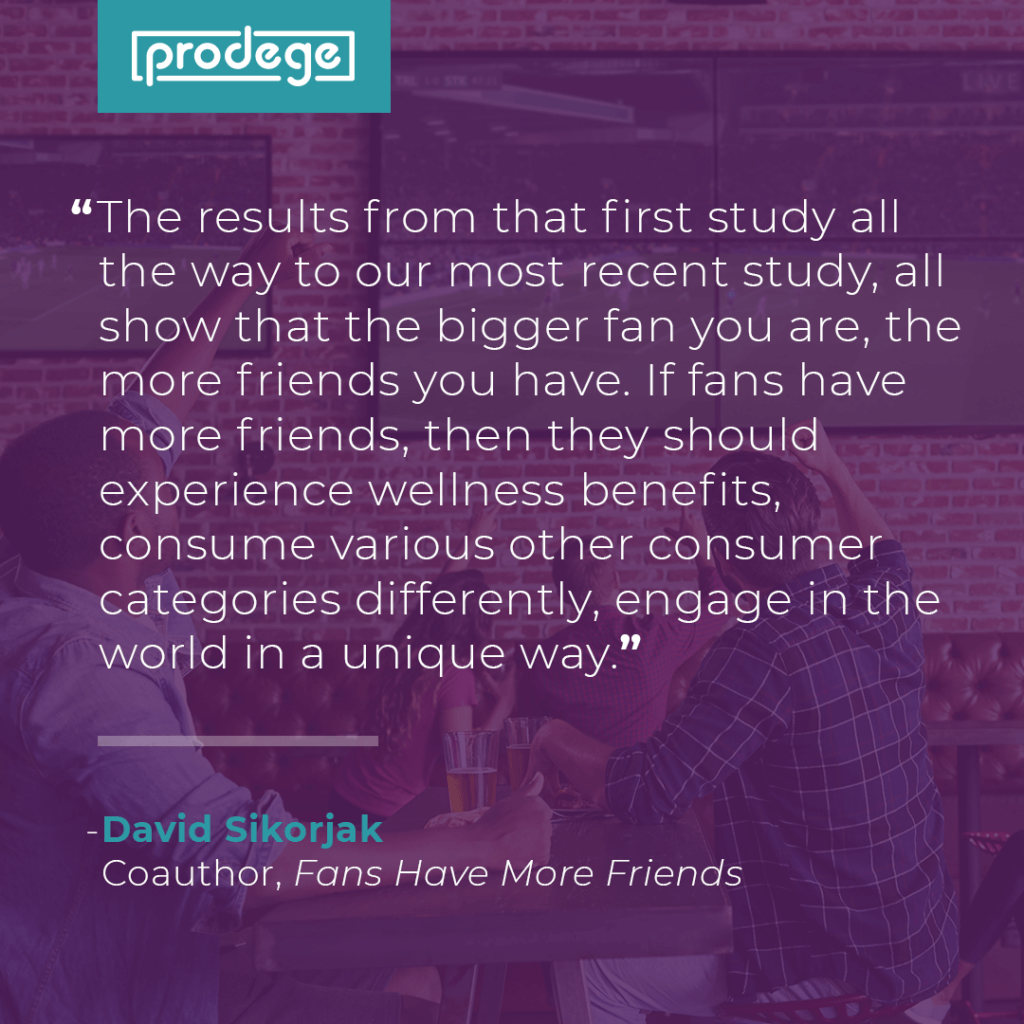Are there benefits to being a sports fan that extend beyond the field? People, products, practices, places, and more make promises of happiness, but can they prove it?
Sports Fandom By the Stats
A passionate sports fan himself, David Sikorjak, founder of Dexterity Consulting and loyal client of Prodege’s wanted to push back on the “conventional conceptions of sports fandom.” David wanted to prove that sports fans are more than just a bunch of tailgaters and cheese block hat-wearers. “In our experience researching sports fans,” David explains, “we were seeing something much more positive, noble, and engaging.”
David teamed up with Ben Valenta, SVP of Strategy & Analytics for FOX Sports, in his quest to dive into sports fandom and, what resulted, is their newly-released book, Fans Have More Friends.
Getting the Ball Rolling
In their jobs as sports research professionals, David and Ben studied engaged fans using focus groups and other research methodologies, and in doing so, they noticed that these individuals “always seemed to have social relationships incentivizing the behavior.” As David puts it, “we started with an insight: ‘to be a fan is to be part of a community’”
In explaining how they arrived at a hypothesis, David says, “our hypothesis then became, if social relationships incentivize fan behavior, then the more engaged of a fan you are, the more robust your social infrastructure should be.”
With the help of Prodege, David and Ben set out to test their hypothesis scientifically and to back up their findings – whatever they may be – with data.

David and Ben were able to develop a line of questioning that measured one’s social infrastructure and enabled them to ultimately determine the number and nature of the various friendships one has. “The results from that first study all the way to our most recent study, all show that the bigger fan you are, the more friends you have. Once we had this methodology set and having proved out this insight we began continually pulling at threads. If fans have more friends, then they should experience wellness benefits, consume various other consumer categories differently, engage in the world in a unique way. So, from 2020 to the present day we began including batteries in our surveys to see how our fan definition would work when applied to the issues of the day (e.g., COVID, Social Justice protests, remote work, etc.). The book captures the many insights by showcasing the findings by tapping into proven question batteries used from psychology, sociology, and political science.”

The Slam Dunk Benefits of Sports Fandom
David and Ben’s findings showed that “the engaged fan experiences a greater sense of belonging” and “if you’re experiencing a greater sense of belonging, then you should be happier, more satisfied with life, more optimistic, more confident, and less lonely.”
David notes that, “We had a good hypothesis of bigger fans having a more robust social infrastructure but seeing it proved out quantitatively over and over again was more than we expected.” And, with Fans Have More Friends, “these findings are brought to life by the stories of various sports fans we met along the way.”
Ready to step up your game and learn more about fandom? Find out where you can get your copy of “Fans Have More Friends” here. If you’ve got research you’re looking to field, step up to the plate and let our team assist you.

Rachel Kaye
Share This Article
Recent Press Releases
Upromise Extends a Helping Hand to Student Loan BorrowersWith 68% of borrowers making financial sacrifices to repay their student loans, Upromise now offers [...]
71% of Self-identified Snorers Have Never Consulted a Healthcare ProfessionalNational survey identifies major obstacles to treating snoring and sleep issues June 28, 2023 08 [...]
Prodege’s 2023 Summer Survey: 55% of Americans Plan to Travel This Summer45% will travel more than last summer. 73% plan to drive with 36% planning to fly to their summ [...]









